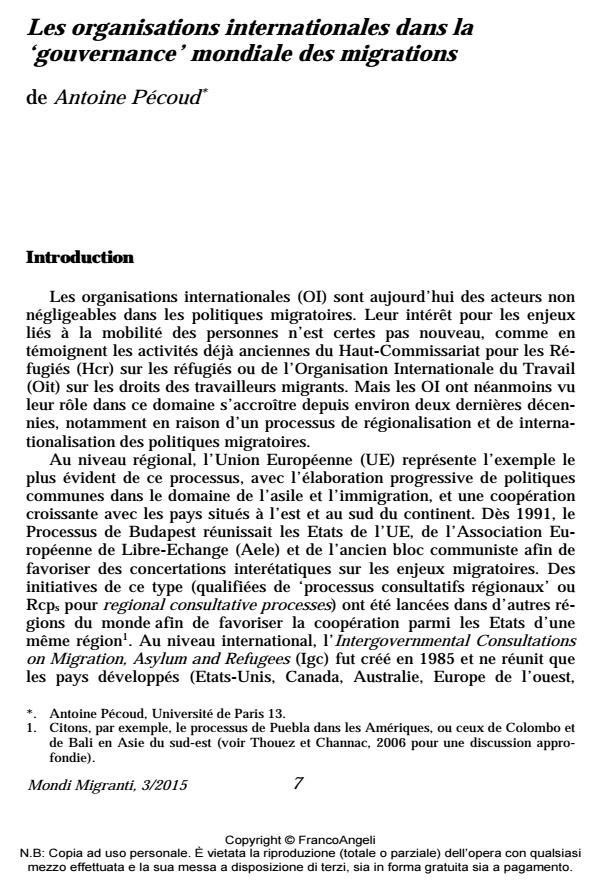Les organisations internationales dans la "gouvernance" mondiale des migrations
Titolo Rivista MONDI MIGRANTI
Autori/Curatori Antoine Pécoud
Anno di pubblicazione 2016 Fascicolo 2015/3
Lingua Francese Numero pagine 24 P. 7-30 Dimensione file 115 KB
DOI 10.3280/MM2015-003001
Il DOI è il codice a barre della proprietà intellettuale: per saperne di più
clicca qui
Qui sotto puoi vedere in anteprima la prima pagina di questo articolo.
Se questo articolo ti interessa, lo puoi acquistare (e scaricare in formato pdf) seguendo le facili indicazioni per acquistare il download credit. Acquista Download Credits per scaricare questo Articolo in formato PDF

FrancoAngeli è membro della Publishers International Linking Association, Inc (PILA), associazione indipendente e non profit per facilitare (attraverso i servizi tecnologici implementati da CrossRef.org) l’accesso degli studiosi ai contenuti digitali nelle pubblicazioni professionali e scientifiche.
Les organisations internationales (OI) sont devenues, depuis environ deux décennies, des acteurs importants dans les politiques migratoires. Même si ces dernières restent étroitement associées à la souveraineté des Etats, les OI sont parvenues à développer leurs propres conceptions sur la manière dont les flux migratoires devraient être gouvernés (ou « gérés ») et, dans certains cas, à influencer l’élaboration des politiques et à s’impliquer dans leur mise en ouvre. Les recherches dans ce domaine restent rares, cependant. A l’exception du Haut-Commissariat pour les réfugiés (Hcr), les OI n’ont guère fait l’objet d’analyses approfondies et de grandes incertitudes demeurent donc, non seulement sur leur influence réelle, mais aussi sur le contexte politique dans lequel elles agissent et sur le résultat de leurs initiatives. Selon certaines interprétations, l’implication des OI permettrait une meilleure coopération internationale et une attention plus grande à des enjeux non-sécuritaires et non-utilitaristes, comme les droits humains ou le développement des régions de départ. A l’inverse, d’autres analyses concluent que les OI tendent à s’aligner sur les intérêts et les priorités des Etats développés, et que leurs interventions ne sauraient donc modifier les politiques migratoires actuelles. Il s’agit donc de questionner l’autonomie des OI, ainsi que l’écart entre leurs objectifs déclarés et leurs pratiques. Il s’agit également de comprendre la manière dont les interventions des OI s’insèrent dans un cadre institutionnel et politique complexe, caractérisé par des relations parfois problématiques entre elles, ainsi qu’entre les OI et d’autres mécanismes internationaux de coopération. Mots-Clés: politiques migratoires, organisations internationales, gouvernance mondiale des migrations
Parole chiave:Migration Policy, Global migration governance, International Organisations
- La fabrique de la politique migratoire sénégalaise Marie-Dominique Aguillon, in Anthropologie & développement /2020 pp.51
DOI: 10.4000/anthropodev.957
Antoine Pécoud, Les organisations internationales dans la "gouvernance" mondiale des migrations in "MONDI MIGRANTI" 3/2015, pp 7-30, DOI: 10.3280/MM2015-003001